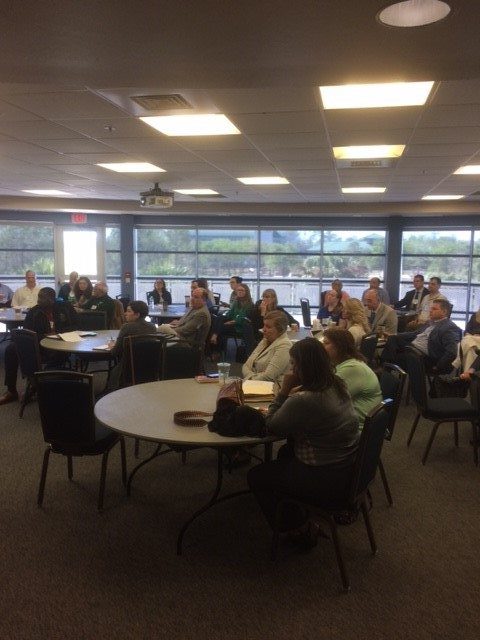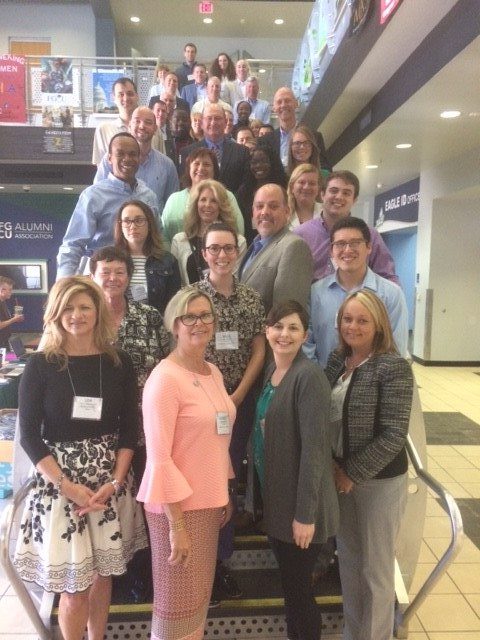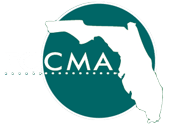


By Kristina King, FCCMA Student Member
FCCMA’s 2018 Spring Symposium “Ad Valorem Taxes and Alternative Revenue Sources,” was held at Florida Gulf Coast University’s Cohen Center on March 16th. This event, co-sponsored by the FGCU ICMA Student Chapter, focused on recent legislative actions and their potential impacts for local governments, identifying and utilizing alternative revenue sources, considering fire assessment fees, best practices for projecting revenues, and other lessons learned. Attendees included FCCMA members, city and county officials, and FGCU graduate and undergraduate students.
The first topic, “How to Plan/Access the Use of Ad Valorem Taxes and other Important Alternative Revenue Sources”, was presented by Steve Botelho, Deputy County Administrator, Sarasota County; Jared Myer, Treasury Manager, Largo; and Meridy Semones, OMB Manager, Largo. Myer started off with an interesting tale of the boll weevil to illustrate the need for multiple revenue sources to decrease risks. Semones explained that with increasing exemptions, property taxes and user fees are not sustainable as the primary sources for local government revenues. Local governments should develop revenue priorities, communicate goals to the public to develop support, and establish a framework for performance reporting. Semones said it is also important to celebrate performance and success with the public so they know what is being achieved. Semones and Myer also discussed the process for establishing a Fire Special Assessment in the City of Largo and emphasized the importance of engaging with the public and explaining the reason for establishing the Fire Special Assessment, how the revenues will be utilized, and keeping the public informed on goal progress. Botelho discussed Sarasota County’s budget approach and demonstrated the tools utilized by the county for budget planning and tracking. Botelho explained that Sarasota County’s millage rate has stayed flat at 3.39% since FY2013 and has been utilizing general fund surplus reserves to balance the budget annually for the last seven years. The county’s surplus reserves are running low and the Board of County Commissioners has said they will not approve a millage increase. Instead the administrative staff have sought other ways to balance the budget, including the deferment of routine maintenance to some facilities, removal of temp agency positions, and placing surplus county-owned parcels up for sale.
Amber Hughes, Senior Legislative Advocate, Florida League of Cities and John Wayne Smith, Peebles and Smith followed up with a presentation on “2018 State Legislative Session Update on the Impacts to City/County Revenues”. Hughes and Smith talked about the latest group of bills that passed and failed in the state legislative session. Included in the group of bills that passed is HB7087, a tax bill providing tax cuts for hurricane relief for agriculture, a three-day back to school tax holiday, a seven-day hurricane preparedness holiday, sales tax exemption for emergency generators for nursing homes, relief for surviving spouse of disabled veterans, and tax relief/refund for hurricane damaged homestead properties. Another tax bill, SB100, exempts local business taxes for veterans, unmarried surviving spouses, active duty spouses, and low-income individuals. The tourist development bill, HB 585, authorizes counties that impose a tourist development tax to use those revenues for building and improvement of certain infrastructure. Hughes and Smith also reviewed bills that were not passed during this session, including a communications services tax, a bill to preempt installation of red light cameras, and transparency bills to increase financial reporting requirements. Smith and Hughes mentioned other trends they are seeing in the legislature, including debates on transparency, and a school safety bill for resource officers. Hughes emphasized the importance of educating yourself on the issues and to provide data to help make the case for changing from property assessments to alternative revenue collection methods. Smith challenged city and county officials to develop relationships with local representatives and to familiarize them with local issues and strengths.
The afternoon presentation, “Do’s and Don’ts in Establishing a Fire Assessment Fee”, was provided by David Jahosky and Jeff Rackley of Government Services Group. Jahosky and Rackley explained how special assessments work, discussed the process and strategies to establish a Fire Assessment Fee, and the restrictions for using a special assessment. Strategies include performing a study to determine needs and base the assessment on, document findings and methodology, develop reports to share with the public, and keep the public updated on the progress of the assessment fee and the direct outcomes or benefits from the special assessment fee.
The symposium event ended with a lively panel discussion led by Terry Atchley, City Manager, Wauchula; Mandy Hines, County Administrator, DeSoto County; Jonathan Lewis, County Administrator, Sarasota County; and Judie Zimomra, City Manager, Sanibel. Hines started the panel with a discussion on millage variances and how drastically the millage and property values can vary from one community to the next. Hines also discussed the use of special assessments for fire, EMS, solid waste, law enforcement, and other services to provide necessary services to the community. Hines said they were able to establish these assessments because they educated the public and invited them to be a part of the process. Lewis talked about his experiences managing different communities and said that people generally don’t like it when the revenue stream is changed. Administrators and officials must be able to accept that sometimes they can prepare presentations, provide the best logical options, and have it shut down by a board or council. Zimomra discussed the unique fiscal challenges that Sanibel faces as the city’s population fluctuates from approximately 700 – 32,000 people during the slow and peak seasons. Zimomra pointed out that no matter where you work, as a public administrator the skill set is the same, you just face different types of problems. Atchley shared some of the challenges of managing the City of Wauchula and how he challenged the city staff to come up with improvements and rethink how things can be done within the organization. Atchley also stressed the importance of advocating for your community, understanding the legislative process and knowing who represents your city or county at the state level. It is also important that we educate those that we serve so that they are also aware on the issues.
Thank you to FGCU ICMA Student Chapter members Matthew Ellenwood, John Meyer, and Elizabeth Elaine, for moderating the event and to Dr. Robert E. Lee, assistant professor in the Department of Political Science and Public Administration and faculty adviser for the FCGU ICMA student chapter.






